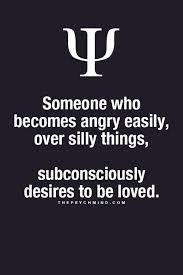Anger- The Fire Inside You
Apr 03, 2019 • 19 views
Anger can make us blind to the truth and unable to accept what’s sensible and correct. When anger is the primary emotion being felt, we become less able to think and act rationally and in some cases, even our senses do not work properly because of extreme anger.

Understanding Anger and Rage
Anger is an emotional response to a real, felt or imagined grievance. It may have its roots in a past or present experience, or it may be in anticipation of a future event. Anger is invariably based on the perception of threat or a perceived threat due to a conflict, injustice, negligence, humiliation and betrayal among others

Physiological Aspects of Anger
Like other emotions, anger is accompanied by physiological and biological changes.When you get angry, your heart rate and blood pressure go up, as do the levels of your energy hormones, adrenaline and noradrenaline, your rate of breathing increases and your body's muscles tense up.

While anger has a physiological preparation phase during which the body resources are mobilized for a fight, it also has a wind-down phase as well. The body starts to relax back towards its resting state when the target of the anger is no longer accessible or an immediate threat. It is difficult to relax from an angry state very quickly. The adrenaline-caused arousal that occurs during anger lasts a very long time (many hours, sometimes days), and lowers the anger threshold, making it easier for the person to get angry again later on. It takes a rather long time for the body to return to the resting state.
Treatment of Anger and Rage
You can learn to control and then convert or redirected these emotions. The aim is to inhibit or suppress your anger and convert it into more constructive behavior.
You can develop strategies for changing both your thinking and behavior.You can develop safe and appropriate emotional and physical techniques to release anger, develop alternate good communication skills, and engage in cognitive restructuring.
You can learn simple relaxation skills as deep breathing and relaxing imagery to help calm down angry feelings. Breathing deeply, from your diaphragm, will help you relax while breathing from your chest will not. Non-strenuous exercise, like yoga, can relax your muscles and make you feel calmer.Certain kinds of vigorous exercise can also help reduce angry feelings.
You can learn to accurately assess your abilities and to alter situations so that you do not prevent yourself from solving your problems and reaching your goals.
You can learn to distinguish between what you hope will happen, what will probably happen, and what actually happened.
New ways of thinking and acting will help you to be more content and happy which, in turn, will help you to more easily overcome anger and frustration. If you are angry, sad, anxious, or depressed you will have less patience and tolerance for everything and everybody. Therapy can help you recognize your frustration and anger, achieve awareness and control, and develop new and healthy ways of thinking and behaving.

